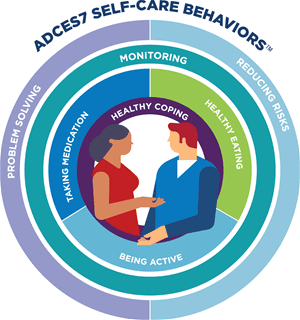
National Diabetes Education Week (NDEW) was recognized November 7-13, 2021. In honor of NDEW and to continue to further awareness of the practical steps available to optimize effective self-management of this disease, I want to talk today a little about the ADCES7 Self-Care Behaviors (ADCES7), an evidenced-based framework that was developed over 20 years ago to provide effective diabetes self-management care and support. While developed over twenty years ago, the model remains as relevant and impactful today as we move towards a more population mindset and practice.

The ADCES7 framework takes a person-centered approach to diabetes (and prediabetes) care, recognizing “the whole person in the context of their life and relationships” and focusing on the healthy behaviors needed to optimize management and outcomes. As illustrated by the graphic above, the ADCES7 are: healthy coping, healthy eating, being active, taking medication, monitoring, reducing risk, and problem solving.
Recently the Association of Diabetes Care & Education Specialists (ADCES) decided to evaluate the ADCES7, updating the framework in the context of a shifting digital and dynamic healthcare landscape. As a result, ADCES7 was updated to integrate the technology advances in science and management that continue to shape diabetes, prediabetes and cardiometabolic care, and to recognize the overlapping and often interdependent nature of the seven behaviors.
One thing that hasn’t changed with the update to ADCES7 is how the framework is used, and its potential to assist diabetes care and education specialists (DCES) to partner with people with diabetes, prediabetes and cardiometabolic conditions to support informed decision making. By using these behaviors as a foundation for one’s practice, you can go beyond education, to partner on successful behavior change that is outcomes-driven using person-centered, self-determined goals.
Another important component to the ADCES7 is its application across health settings. Whether you work at a large health system or Community Health Center, such as Federally Qualified Health Centers (FQHCs), members of the healthcare team can translate challenging topics related to these behaviors to improve the health and quality of life of their patient population. The portability of this framework is important, particularly as Community Health Centers continue to serve an increasing number of patients with prediabetes, at risk of developing type 2 diabetes, or with type 2 diabetes. While ADCES7 was updated to reflect changes in technology and the health landscape, it also again confirmed the importance and impact of empowering and supporting individuals in their own care. Utilizing the ADCES7 in programs such as the National DPP lifestyle change program and Diabetes Self-Management Education & Support (DSMES), patients can better understand each behavior and how it affects their self-management.
Visit ADCES’s National Diabetes Education Week page to learn more about the ADCES7 Framework and tools for its application. Resources include podcast discussions among diabetes educators on implementing the ADCES7 framework, patient resources, and registration for training on the model.

